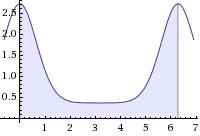I hope it does not involve some contour integral like \mathop\oint_C e^z dz where C is the unit circle.
9 Answers
Hint
Take another intergral so that you can apply
cos a + i sin a
(This one i guess was replied long back!)
well quiet surprisingly i asked this q couple of days bak on aops
btw i din get a proper soln which is within jee level...got similar soln as pointed by prophet sir
check these-
http://www.mathlinks.ro/viewtopic.php?p=1765554#1765554
http://www.mathlinks.ro/viewtopic.php?search_id=492916690&t=296990
maybe nishant sir or prophet sir cud tell us that method which is within syllab?
Well it looked like we are looking at real part of \int_0^{2 \pi} e^{\cos \alpha + i \sin \alpha} \ d \alpha which in complex integrals would turn out to be a contour integral\mathop\oint_C e^z \ dz where C is the unit circle
That simply means integrating ez along the circle |z| =1.
Now I reasoned that we can use the Power Series expansion as e^z = 1 + z + \frac{z^2}{2!} +... and put z = \cos \alpha + i \sin \alpha and integrate between limits 0 and 2 pi.
Using De Moivre's theorem, its easy to see that the integral is equal to 2 \pi
Hence \int_0^{2\pi} e^{\cos \alpha} \cos (\sin \alpha) \ d \alpha = 2 \pi
Mind you this is still just hand waving (we havent discussed if ez is analytic etc. for instance). I havent touched Complex Analysis since my undergrad days. But it doesnt look like any rule's been flouted :D
Interestingly this is a problem given as a MCQ in FIITJEE's Full-Test Qsn Paper! [4]
http://targetiit.com/iit-jee-forum/posts/nice-integral-14127.html
Che spoilt the fun there [3]
I think if we could safely say that integrating something complex doesnt yield anything real...
then the reqd. thing would be the real part of something like
\int_0^{2 \pi} e^{\cos \alpha + i \sin \alpha} \ d \alpha
then onwards it is very simple.
that mathlinks link wasnt quite helpful to me what with their smelling some hi - fi functions ...!!
but yes this does seem like a bit of loose talk this way
Or one get by direct substitution z=\cos\alpha+i\sin\alpha, that
\int_0^{2\pi}e^{\cos\alpha+i\sin\alpha}\mathrm d\alpha \to \dfrac{1}{i}\oint_C \dfrac{e^z}{z}\ \mathrm dz
Expand the exponential in power series and use the fact that for a power function over the unit circle \int_C z^n \ \mathrm dz =0 (n = positive integer) while
\int_C \dfrac{1}{z} \ \mathrm dz = 2\pi i (Cauchy's theorem)
to get the required integral as 2\pi.
P.S. In general
\int_0^{n\pi}e^{\cos\alpha} \cos(\sin\alpha)\ \mathrm d\alpha =n\pi for n a positive integer.
Incidentally, we also get
\int_0^{2n\pi}e^{\cos\alpha} \sin(\sin\alpha)\ \mathrm d\alpha =0 for positive integer n.
